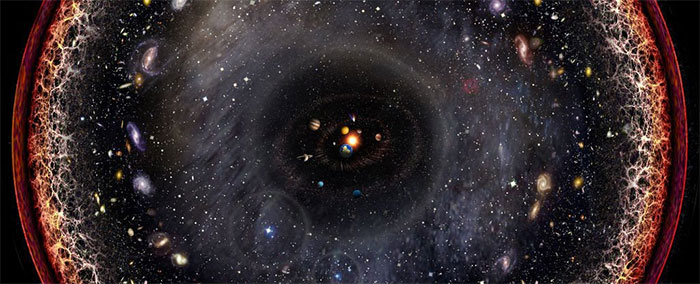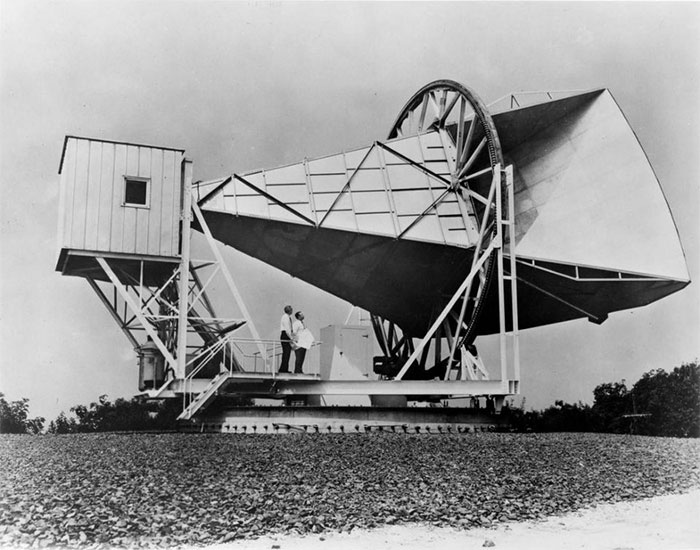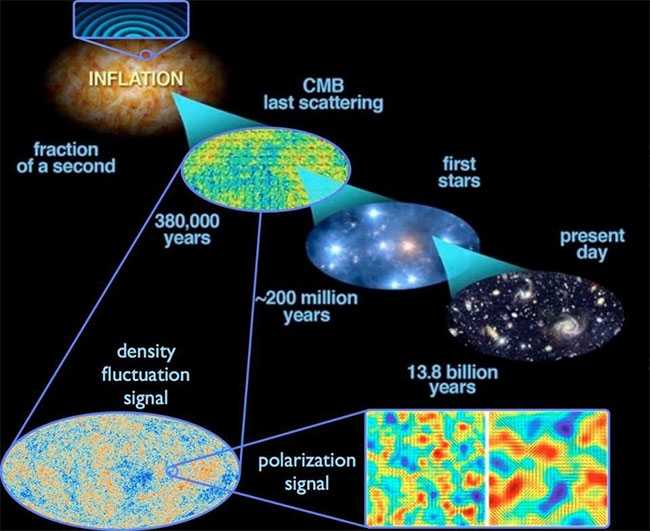Where do scientists know aliens? (Discover Aliens - UFO)
The vast, seemingly infinite, invisible universe may be home to alien inhabitants.
According to Vice, for hundreds of years, people from all cultures have been attracted to the appeal of horizons. This is what drives us to make many dangerous trips across the land, across the ocean and even into outer space.
Still, the mysteries of the cosmic horizon, or the fringes of the observable universe, remain unsolved.
As the name implies, the visible universe is the part of human space that can be observed from modern observatories. As astronomical vision improved over the centuries, it was also the time when scientists discovered that going into space was also a way to travel to the past.
For example, if you look at a star 8 light-years from Earth like Sirius, the image in your eyes is the Sirius of 8 years ago.
The observed universe is only a tiny fraction of the infinite vast size of the whole universe. Uncovering the mysterious veil of space above is the mission set by mankind.

What is outside the cosmic horizon? (Photo: Science Alert).
This mission is not easy, given the limitations of distance over time we can see directly due to the light of cosmic background radiation (CMB). In addition, the cosmic horizon - the boundary that separates the visible and the invisible universe - is also a barrier that makes observation more difficult.
In the vast space beyond the reach of what exist? Inexplicable physical phenomena, new worlds or even alien life forms? Can we discover it, or will it remain in human theory?
What is the cosmic horizon?
If we assume that the universe is 13.8 billion years old and light travels at the same speed, the radius of the universe could be at 13.8 billion light years. But one thing that moves faster than light is the expansion of the universe.
"Photons are easier to travel from A to B in the early universe, than in later space because initially the distance between them is much shorter," said Malcolm Fairbairn, a cosmologist at King's College London. prefer.
Such as cosmic background radiation. The faint light we see in all directions, is the light emitted when the universe is several hundred thousand years old.
Photons from cosmic background radiation may be about 13 billion years old, but they come from where we are now about 46 billion light-years away.
"As soon as humans are aware of the expansion of the universe, we also begin to think about the distance from where the signal was received based on how the universe expanded in the past," Fairbairn said.
That distance is called the cosmic horizon and will get farther as the universe ages. If civilized life still exists in the solar system after a billion years, it is very likely that future people will discover new galaxies and stars when their last light hits the Earth.

In 1964, two researchers, Penzias and Wilson, stood at the 15-meter-high observatory of the Holmdel Horn Antenna for the first time they discovered the cosmic microwave background, and electromagnetic radiation was born from the early universe. (Photo: NASA).
However, the cosmic horizon is not the only boundary that scientists define on a cosmic scale. As the universe expanded, the further away the objects were, the faster they could leave the Earth. At the defined boundary, called the horizon or Hubble sphere, the object begins to retreat faster than the speed of light.
The current cosmic horizon is much wider than the Hubble skyline by several billion light years. This allows us to observe objects moving away from Earth at speeds of "supersonic motion," much faster than the speed of light.
Based on known physical knowledge, these objects do not move through space at a speed faster than the speed of light. Instead, spacetime goes far beyond the speed of light. That is, if aliens exist in some galaxy we can see outside the Hubble horizon, then we still cannot contact them in the cosmic horizon.
Any message we send, even at the speed of light, never catches the expansion of space outside the Hubble horizon.
Are there aliens outside the cosmic horizon?
Naturally, no one can know what exists outside the cosmic horizon. But theoretically, across the cosmic horizon will be the world completely like the inside.
This cosmic unity can disappoint those who like to dream about a different fantasy world. However, at the same time it also gave rise to a new hypothesis: It is possible that life has evolved elsewhere in the universe.
For decades, scientists have been trying to prove the theory of alien life. However, the hypothesis is still a hypothesis and there is no real evidence.
Tomonori Totani, an astrophysicist at the University of Tokyo, Japan, offers a new way of proving by expanding the scope of "natural arising" - the term for the origin of life. Instead of just focusing on finding life inside the visible universe, he expanded his life research into "the entire expanding universe," including everything outside the cosmic horizon.
Totani said that it is entirely possible to seek for spontaneous arising outside the visible universe, since everyone knows that the universe has no limits.

Quantum fluctuations (or quantum variations) during the time of the expansion of the universe created energy at one point in space, thereby creating stars, galaxies and other large-scale structures in today's universe. (Photo: Forbes).
"However, the search for natural arising is not easy, even if the scope is only within the visible universe," Totani noted, "However, if life appears in the true size of the universe expanded, explaining life on Earth was easy. ”
Totani is not the first scientist to come up with the idea of life inside the invisible universe. He used the theory of the infinite universe, which can contain a multiverse of many universes and is very likely to survive the life of Eugene Koonin, senior researcher at the American Center for Biotechnology.
Although the above hypothesis may provide a new direction for researchers, having civilizations outside the cosmic horizon is still a difficult theory to accept.
Is it possible to observe things beyond the cosmic horizon?
The answer is no. Although we still get some new light outside the current horizon in the next few billion years, at the current rate of expansion, the universe will expand to the extent that systems can only be seen. nearest galaxy.
Fairbairn said that if the universe was filled with things like matter, radiation and photons, sooner or later we would still be able to see further as the cosmic horizon gradually receded. But because of the impact of dark matter, that will never happen.
However, nothing can stop the scientists' progress toward the unseen universe. According to recent studies, they have found a way to block gravitational waves, which were born 1 / 1,000 seconds after the Big Bang.

Pictures represent the theory, each universe (small particles) are tied together. (Photo: Vice).
According to the scientists, gravitational waves are created by interruptions in spacetime, such as collisions of black holes and neutron stars, which are events occurring in the relatively modern universe. In addition, these strange waves can also be generated by physical processes right after the universe was born.
Fairbairn said these gravitational waves occurred earlier than any previously known signal. And because they are not affected by cosmic background radiation, we can look further, even back in time. It is the gravitational waves that will be reliable data for us about the change of the cosmic horizon in the past.
The fact that a world beyond the cosmic horizon is inviolable seems difficult to accept, but nonetheless, we already have a fairly wonderful visible universe, even if it is only a small part of infinite vast entity.
How did humans find the existence of aliens?
Why is it that when people are always eager to watch videos about UFOs, scientists are indifferent?
FIDITOUR TRAVEL COMMUNICATION COMPANY
Representative: Mr. Tran Van Long - Chairman and General Director
Head office: 95B-97-99 Tran Hung Dao, District 1, City. Ho Chi Minh.
Hanoi Branch: 66 Tran Hung Dao, Hoan Kiem District, Hanoi
Phone: 028 730 56789 | Hotline: 19001177